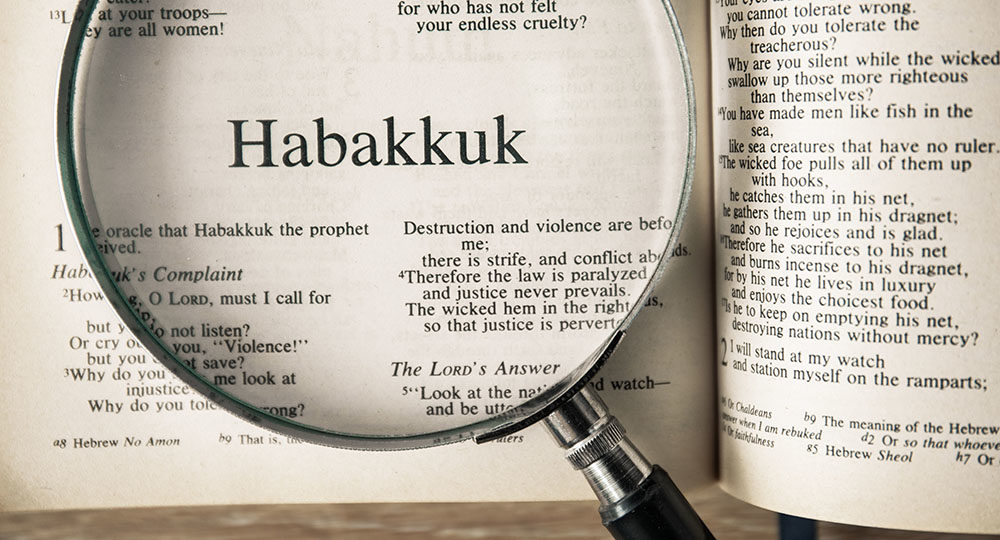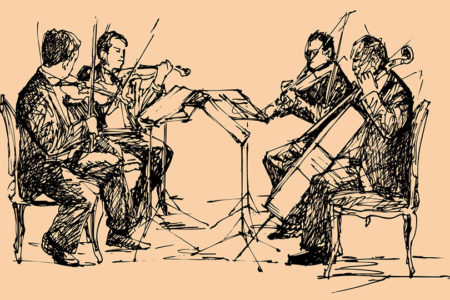The More Things Change…
The more things change, you know the rest: the more they stay the same. We received a grisly reminder of the accuracy of that observation with the report of an incident in the life of Uday, the now deceased son of Saddam Hussein.
Uday reportedly was carrying the decapitated head of an enemy to present to his father on a golden platter. One is immediately reminded of the fate of John the Baptist two thousand years ago and the conduct of affairs in such ancient empires as Babylon many centuries earlier.
This empirical evidence blows apart the fiction that man is innately good and that the human species is on an ever-upward climb toward a utopian semiparadise. With such evidence in hand, it is inconceivable that otherwise intelligent individuals would tenaciously hold to the “spark of good” folly and refuse to consider that an ingrained streak of depravity might run through the human family. Inconceivable, that is, unless we understand the natural man’s compulsion to break free from the facts transmitted in God’s Word and documented on every page of the human chronicle.
At the root of the issue is the irrevocable rejection of the premise that sinful humanity needs a sinless Savior. Put another way, people cling to a lie because they consistently and increasingly repudiate the gospel message and anyone who dares to proclaim it. But the evidence is in, and we need only continue reminding the offenders—and ourselves—that the basic problems assailing this planet are spiritual. And that’s where our approach to problem solving must begin.
Just the Facts, Please
Let’s turn the clock back to the seventh century B.C. The spotlight was on Babylon and what that marauding, imperial juggernaut was about to do to errant Israel. In that day it was not Scud missiles that assaulted the Jewish people. It was the hordes of Nebuchadnezzar, armies that were “terrible and dreadful” and spared none as they crushed weaker nations.
Conditions within Israel were succinctly described by the prophet Habakkuk as intolerable to God. So much so, that the Lord was going to use corrupt and violent Babylon to give the Israelites a taste of the fruits of their depravity:
O LORD, how long shall I cry, and thou wilt not hear! Even cry out unto thee of violence, and thou wilt not save! Why dost thou show me iniquity, and cause me to behold grievance? For spoiling and violence are before me; and there are those who raise up strife and contention. Therefore, the law is slacked, and justice doth never go forth; for the wicked doth compass about the righteous; therefore, justice goeth forth perverted (Hab. 1:2–4).
The prophet leveled a number of charges at his countrymen: (1) iniquity, (2) exploitation of the weak, (3) violence, (4) rabble-rousing contention, (5) disregard for law, (6) judicial injustice, (7) prevailing culture of wickedness, and (8) perverted justice.
Thus the situation was reduced to several inescapable realities. From without, the Babylonians were about to wreak havoc on, spoil, destroy, and enslave the cream of Israelite society. In that mix was the destruction of the Temple and carrying away as booty the furnishings of the sacred chambers.
From within, the situation had become irredeemable. And the divine bill of particulars was certified in a series of woes pronounced against the leaders and people of the land: drunkenness (2:5); insatiable covetousness and a desire to defraud the innocent (2:9); social impurity, lewdness, and the equivalent of drug addiction (2:15); and unbridled devotion to idolatry (2:18–19).
Little wonder that Habakkuk and his fellow prophets vented their frustration before the Lord (2:1). They simply could not comprehend what had gone wrong with the Chosen People. One thing they did understand, however. And it likely fueled their bewilderment.
The prophets understood well that Israel was created to be a witness nation among godless Gentile world powers. They knew that the Israelites were a nation in waiting. Waiting for the Messiah, waiting for the coming of the promised King. Therefore, if the nation were dispersed or destroyed, all would be lost.
The God/Satan Struggle
The conflict was far bigger than it appeared. What difference would it have made if another relatively insignificant nation had passed from the scene? After all, that seemed to be an almost daily occurrence in the ancient world. The Babylonians, Persians, Greeks, and Romans regularly folded small nations into their imperial portfolios.
But it was different with this people and this nation. Across the millennia the great world empires have marched in succession into Israel and attempted to craft her destruction. They are all dead and gone. Israel is alive and well. This fact alone should cause people, especially Christians, to understand that the preservation of the Jewish people against all odds is not a mutation of the historical norm.
In his extremely insightful book What on Earth Is God Doing? Renald Showers documents the larger issue. While we have only a horizontal, limited view of the traumatic convolutions of history, God has the whole view. World history, as Dr. Showers deftly chronicles, is a struggle between God and his arch adversary, Satan. The composition of the conflict is in the Word of God; the confirmation is written in the history of fallen humanity.
Why is it that one of the stated dreams of the “new Nebuchadnezzar,” Saddam Hussein, was to float a barge carrying a nuclear device into Haifa harbor and detonate it? Why would the Iranians make a great case of developing ballistic missiles with a range that could strike every city in Israel? What purpose is there for a Palestinian graduating class of 2003 in Gaza to sing at its commencement exercises, “With words and with a rifle we will sing . . . from Jerusalem to Gaza”? Or for Palestinian children attending summer camps named in honor of suicide bombers to receive military training in hopes of destroying Israel?
Any rational human being must conclude that there is something going on that involves a larger, malignant strategy; and at the center of the contest are Israel and the Jewish people.
All of which causes us to press the point that Christians should recognize the integral position of Israel in God’s plan and that the keys to this understanding lie in the Book. Some speak disparagingly about believers who adhere to the literal and historical interpretation of Scripture, refuse to allegorize Israel into the church, and stand as Christian Zionists by what God has dictated. Yet these positions are essential to remaining true to the essence of the matter delineated in Genesis 12:1–3: “I will bless them that bless thee, and curse him that curseth thee” (v. 3).
The Answer Is On the Way
Habakkuk’s answer to all of his turmoil and Israel’s trouble came in three segments. First was the assurance that God had not left the premises:
But the LORD is in his holy temple; let all the earth keep silence before him (2:20). The Lord was precisely where
He should have been, doing exactly what He should have been doing. And where is He today when we need Him most? Right there, controlling everything taking place. God is in charge of the end game. We may grope about seeing things “through a glass, darkly”; but we can rest in the absolute competence of the Lord.
Second, final rest and reward are anticipated:
For the earth shall be filled with the knowledge of the glory of the LORD, as the waters cover the sea (2:14).
This promise was given in the midst of Israel’s darkest hour. The brightest shafts of divine light always seem to rise from the hottest cauldrons of distress and uncertainty. An era of millennial bliss is coming, when the knowledge and glory of Jehovah will be universal realities. One day the Messiah will mount His throne in Jerusalem; and His adversaries, and ours, will be no more.
It is intriguing that God always encouraged ancient Israel to look ahead. The King and Kingdom were coming. During this dispensation of grace, believers are admonished to keep looking up in expectancy of the blessed hope, His coming in clouds to call us home to Him.
When “It” Becomes a “He”
The link between Old Testament revelation and New Testament Scripture is a constant source of instruction and inspiration and is indispensable to grasping the whole of God’s perfect plan. Habakkuk provides a vivid example:
For the vision is yet for an appointed time, but at the end it shall speak, and not lie; though it tarry, wait for it, because it will surely come, it will not tarry. Behold, his soul that is lifted up is not upright in him; but the just shall live by his faith (2:3–4, emphasis added).
The vision of deliverance was associated with the appearance of “it.” The identity of “it” is clarified in Hebrews 10:37: “For yet a little while, and he that shall come will come, and will not tarry.”
Thus the “it” of Habakkuk becomes “he” in Hebrews. And who is “he”? Without question, he is the Messiah. Thus the final segment of Habakkuk’s three-part answer to Israel’s troubles involves the personal intervention of Jehovah on behalf of his people.
This revelation contains a marvelous fusion of truth, one we can ill afford to miss. For in the immediate context of exposing the identity of the one referred to as “he,” there leaps from the pages of God’s Word the fullness of Messiah’s mission for Israel and individuals of all elements of humanity who believe. This truth is bound up in a few simple words, “But the just shall live by his faith” (2:4).
The New Testament associates the quotation from Habakkuk with redemption (Rom. 1:16–17), victory over the law (Gal. 3:11), and living a triumphant life in the Messiah (Heb. 10:38).
A Standard for the Season
At this special season of the year, when Jewish people commemorate the deliverance of Israel and her people from the threat of annihilation and Christians celebrate the incarnation, we have a marvelous opportunity to pause and commemorate God’s steadfastness. Although it is true, humanly speaking, that the more things change, the more they stay the same, this season is a reminder that an immutable God changes not and that He who watches over His people neither slumbers nor sleeps.







